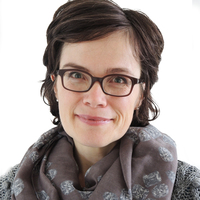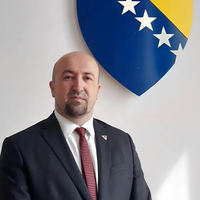
Florian Qehaja
Address: Kosovo
less
Related Authors
Natasia Kalajdziovski
Middlesex University
Shpend Kursani
University of Tartu
Rudine Jakupi
Linköping University
Dallin T Van Leuven
Fletcher School, Tufts University
Arber Fetiu
Université de Montréal
Gerta Zaimi
Università degli Studi di Firenze (University of Florence)
Marko Babić
University of Warsaw
InterestsView All (18)










Uploads
Papers by Florian Qehaja
Kosovar Centre for Security Studies (KCSS)
Title:
The unexplored nexus: Issues of radicalisation and violent extremism in Macedonia
Authors:
Dr Florian Qehaja and Skënder Perteshi
Date:
13 March 2018
Violent extremism and radicalisation in Macedonia are at the crux of the complex puzzle in the broader jigsaw of state-building and societal cohesion. While the individual drivers of violent extremism in Macedonia are consistent to findings elsewhere, this study uncovers structural drivers rooted specifically in the Macedonian context, all of which have contributed to the longer-term consequences that paved the way to radicalisation. As a consequence, the myriad of societal and inter-ethnic problems led to the religionization of a part of the society and the entrenchment of ethnic groups in their own particular identity, with some adopting a more conservative national or religious ideology. The growth of radicalisation and extremism has occurred “under the surface”, within a context of uneven domestic politics and the contested international political standing of the country pertaining name issue.
On occasion there have even been cases where the previous ruling party of Macedonia has misrepresented the presence of religious extremism to deepen the ethnic cleavages in the country. With the new government of mid-2017, however, the country is taking a clear and more comprehensives tandon the issue. There have been tangible efforts to properly invest on the prevention of violent extremism specifically and facilitate better inter-ethnic relations generally in the country.
Kosovar Centre for Security Studies (KCSS)
Title:
“Mapping the state of play of institutional and community involvement in countering violent extremism in Kosovo”
Authors:
Florian Qehaja, Skënder Perteshi and Mentor Vrajolli
Date:
13 February 2017
This report identifies the key drivers of extremism in Kosovo following a holistic assessment. While there is the political will to counter violent extremism - at least compared to a lack of willingness to fight corruption and organized crime – the results to date are limited. The main results are identified from the work of law enforcement bodies, which appear to be by far the most proactive institutions working in countering and preventing violent extremism. The policy framework in this field did not entirely reflect community needs. For example, the involvement of community representatives including the Islamic Community is limited. This report aims to provide concrete suggestions for reducing the potential for violent extremism. The key findings are summarized below:
• Kosovo has adopted a sound policy framework in the field. Its implementation has been challenged as a result of limited capacities and the absence of community involvement;
• Kosovo has adopted a law banning its citizens from joining foreign conflicts. This law has produced some positive outcomes in the short term;
• The first local referral mechanism has been introduced in the municipality of Gjilan. This referral mechanism is made up by Ministry of Interior Affairs in Kosovo and is composed local governance structures, civil society and Islamic community representatives aiming to contribute to preventing violent extremism in this municipality;
• The Kosovo Government has started to design two reintegration and de-radicalization programmes aiming to integrate former foreign fighters and their family members into society. These two programmes are expected to start implementation in the first half of 2017;
• There is an overall attempt from the donor community to be involved in the process of prevention and de-radicalization. Results
can only be achieved when local ownership is fully ensured and the international community stays in the “back seat”;
• Overall, there is a limited understanding of violent extremism among institutions, particularly at a local level. The Kosovo Police and Ministry of Internal Affairs are the best-informed institutions. There is also ongoing community confusion in handling religion-based extremism as a new type of violent extremism;
• There is poor inter-institutional cooperation in the field of countering violent extremism;
• Civil society is barely involved. The role of the Islamic Community continues to be undermined. Increased involvement of the Islamic Community and communities in general is essential to national endeavors;
• Lack of opportunities and jobs for the youth in the three selected municipalities (and other municipalities) have created the unintended consequence of youth being recruited into extremist ideologies and participation in foreign conflicts in Syria and Iraq;
• The poor educational system and lack of extra-curricular activities also creates space for recruiters to pursue their agendas. The absence of critical thinking within the public school system creates space for individuals and groups with violent ideologies to manipulate the youth. Often, their ”methodology” appears much more attractive than some conventional teachers;
• The isolation of Kosovars and ongoing visa regime by the European Union presents an overall obstacle for the youth. This allows youth to travel with no visa requirements to the Middle East and Turkey, often ending up in Islamic schools with the most conservative thinking.
This report is supported by Ministry for Foreign Affairs of Finland and is Commissioned by The Network for Religious and Traditional Peacemakers.
Society Capacity Building on Mapping and Monitoring the Security Sector
Reform in the Western Balkans, 2009-2011”. This regional project involved
7 regional think-tank organizations from Albania, Bosnia and Herzegovina,
Croatia, Kosovo, Macedonia, Montenegro and Serbia, eveloped in cooperation with the Geneva Centre for the Democratic Control of Armed Forces (DCAF) (www.dcaf.ch). The methodology for the mapping and monitoring of security sector reform was developed by Belgrade Centre for Security Policy (www.ccmr-bg.org). The project is financially supported by the Ministry of Foreign Affairs of the Kingdom of Norway.
Books by Florian Qehaja
Kosovar Centre for Security Studies (KCSS)
Title:
The unexplored nexus: Issues of radicalisation and violent extremism in Macedonia
Authors:
Dr Florian Qehaja and Skënder Perteshi
Date:
13 March 2018
Violent extremism and radicalisation in Macedonia are at the crux of the complex puzzle in the broader jigsaw of state-building and societal cohesion. While the individual drivers of violent extremism in Macedonia are consistent to findings elsewhere, this study uncovers structural drivers rooted specifically in the Macedonian context, all of which have contributed to the longer-term consequences that paved the way to radicalisation. As a consequence, the myriad of societal and inter-ethnic problems led to the religionization of a part of the society and the entrenchment of ethnic groups in their own particular identity, with some adopting a more conservative national or religious ideology. The growth of radicalisation and extremism has occurred “under the surface”, within a context of uneven domestic politics and the contested international political standing of the country pertaining name issue.
On occasion there have even been cases where the previous ruling party of Macedonia has misrepresented the presence of religious extremism to deepen the ethnic cleavages in the country. With the new government of mid-2017, however, the country is taking a clear and more comprehensives tandon the issue. There have been tangible efforts to properly invest on the prevention of violent extremism specifically and facilitate better inter-ethnic relations generally in the country.
Kosovar Centre for Security Studies (KCSS)
Title:
“Mapping the state of play of institutional and community involvement in countering violent extremism in Kosovo”
Authors:
Florian Qehaja, Skënder Perteshi and Mentor Vrajolli
Date:
13 February 2017
This report identifies the key drivers of extremism in Kosovo following a holistic assessment. While there is the political will to counter violent extremism - at least compared to a lack of willingness to fight corruption and organized crime – the results to date are limited. The main results are identified from the work of law enforcement bodies, which appear to be by far the most proactive institutions working in countering and preventing violent extremism. The policy framework in this field did not entirely reflect community needs. For example, the involvement of community representatives including the Islamic Community is limited. This report aims to provide concrete suggestions for reducing the potential for violent extremism. The key findings are summarized below:
• Kosovo has adopted a sound policy framework in the field. Its implementation has been challenged as a result of limited capacities and the absence of community involvement;
• Kosovo has adopted a law banning its citizens from joining foreign conflicts. This law has produced some positive outcomes in the short term;
• The first local referral mechanism has been introduced in the municipality of Gjilan. This referral mechanism is made up by Ministry of Interior Affairs in Kosovo and is composed local governance structures, civil society and Islamic community representatives aiming to contribute to preventing violent extremism in this municipality;
• The Kosovo Government has started to design two reintegration and de-radicalization programmes aiming to integrate former foreign fighters and their family members into society. These two programmes are expected to start implementation in the first half of 2017;
• There is an overall attempt from the donor community to be involved in the process of prevention and de-radicalization. Results
can only be achieved when local ownership is fully ensured and the international community stays in the “back seat”;
• Overall, there is a limited understanding of violent extremism among institutions, particularly at a local level. The Kosovo Police and Ministry of Internal Affairs are the best-informed institutions. There is also ongoing community confusion in handling religion-based extremism as a new type of violent extremism;
• There is poor inter-institutional cooperation in the field of countering violent extremism;
• Civil society is barely involved. The role of the Islamic Community continues to be undermined. Increased involvement of the Islamic Community and communities in general is essential to national endeavors;
• Lack of opportunities and jobs for the youth in the three selected municipalities (and other municipalities) have created the unintended consequence of youth being recruited into extremist ideologies and participation in foreign conflicts in Syria and Iraq;
• The poor educational system and lack of extra-curricular activities also creates space for recruiters to pursue their agendas. The absence of critical thinking within the public school system creates space for individuals and groups with violent ideologies to manipulate the youth. Often, their ”methodology” appears much more attractive than some conventional teachers;
• The isolation of Kosovars and ongoing visa regime by the European Union presents an overall obstacle for the youth. This allows youth to travel with no visa requirements to the Middle East and Turkey, often ending up in Islamic schools with the most conservative thinking.
This report is supported by Ministry for Foreign Affairs of Finland and is Commissioned by The Network for Religious and Traditional Peacemakers.
Society Capacity Building on Mapping and Monitoring the Security Sector
Reform in the Western Balkans, 2009-2011”. This regional project involved
7 regional think-tank organizations from Albania, Bosnia and Herzegovina,
Croatia, Kosovo, Macedonia, Montenegro and Serbia, eveloped in cooperation with the Geneva Centre for the Democratic Control of Armed Forces (DCAF) (www.dcaf.ch). The methodology for the mapping and monitoring of security sector reform was developed by Belgrade Centre for Security Policy (www.ccmr-bg.org). The project is financially supported by the Ministry of Foreign Affairs of the Kingdom of Norway.